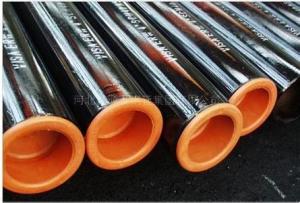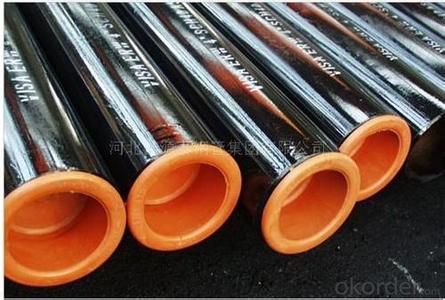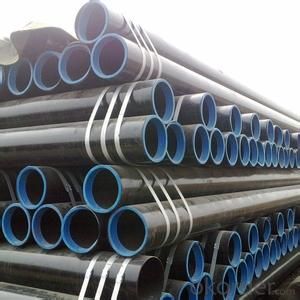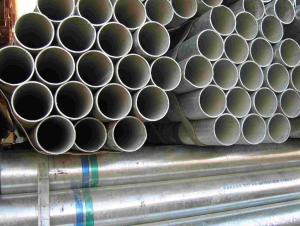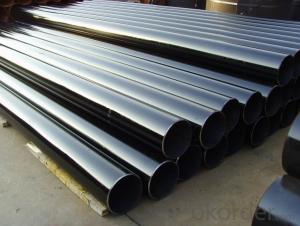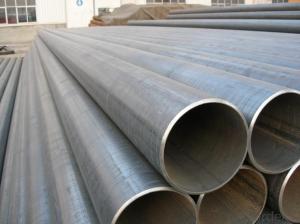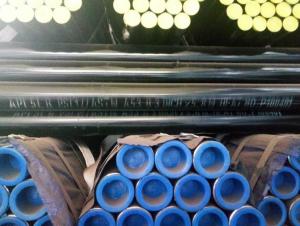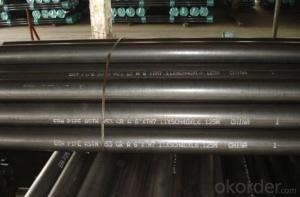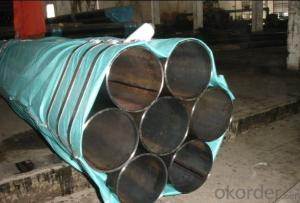APL 5L ERW Steel Pipe
- Loading Port:
- China Main Port
- Payment Terms:
- TT or LC
- Min Order Qty:
- 60 m.t.
- Supply Capability:
- 9000 m.t./month
OKorder Service Pledge
OKorder Financial Service
You Might Also Like
1、Structure of APL 5L ERW Steel Pipe:
ERW steel pipe is electric resistance welding, the abbreviation for ERW for transporting oil and natural gas vapor liquid objects, can meet the requirements of high and low pressure, the transport in the world with pipe sector accounted for a pivotal position.
2、Main Features of APL 5L ERW Steel Pipe:
• High manufacturing accuracy
• High strength
• Good visual effect
• Reasonable price
• Small inertia resistance
• Strong heat dissipation ability
3、APL 5L ERW Steel Pipe Specification:
Standard | GB, DIN, ASTM ASTM A106-2006, ASTM A53-2007 |
Grade | 10#-45#, 16Mn 10#, 20#, 45#, 16Mn |
Thickness | 1 - 33 mm |
Section Shape | Round |
Outer Diameter | 21 - 610mm |
Place of Origin | Tianjin, China (Mainland) |
Secondary Or Not | Non-secondary |
Application | Hydraulic Pipe |
Technique | Cold Drawn |
Certification | API |
Surface Treatment | factory state or painted black |
Special Pipe | API Pipe |
Alloy Or Not | Non-alloy |
Length | 5-12M |
Outer Diameter | 21.3-610mm |
Grade | 20#, 45#, Q345, API J55, API K55, API L80, API N80, API P110, A53B |
Standard | ASME, ASTM |
1) Material:20#(ASTM A 106/A53 GRB.API5LGRB,GB),45#,16Mn,10#.
2) Specification range:OD:21.3-610mm,WT:6-70mm,length:6-12m or according to the requirement of clients.
3) Excutive standards:GB,ASME API5L.ASTM A 106/A53,Despite of the above standards,we can also supply seamless steel pipe with standard of DIN,JIS,and so on,and also develop new products according to the requirements of our clients!
4) Surface:black lacquered,varnish coating or galvanized.
5) Ends:Beveled or square cut,plastic capped,painted.
6) Packing:bundles wrapped with strong steel strip,seaworthy packing.
4、Packaging & Delivery
Packaging Details: | seaworthy package,bundles wrapped with strong steel strip |
Delivery Detail: | 15-30days after received 30%TT |
5、FAQ of APL 5L ERW Steel Pipe:
①How is the quality of your products?
Our products are manufactured strictly according to national and internaional standard, and we take a test
on every pipe before delivered out. If you want see our quality certifications and all kinds of testing report, please just ask us for it.
Guaranteed: If products’ quality don’t accord to discription as we give or the promise before you place order, we promise 100% refund.
②How about price?
Yes, we are factory and be able to give you lowest price below market one, and we have a policy that “ for saving time and absolutely honest business attitude, we quote as lowest as possible for any customer, and discount can be given according to quantity”,if you like bargain and factory price is not low enough as you think, just don’t waste your time.Please trust the quotation we would give you, it is professional one.
③Why should you chose us?
Chose happens because of quality, then price, We can give you both.Additionally, we can also offer professional products inquiry, products knowledge train(for agents), smooth goods delivery, exellent customer solution proposals.Our service formula: good quality+good price+good service=customer’s trust
SGS test is available, customer inspection before shipping is welcome, third party inspection is no problem.
6、 APL 5L ERW Steel Pipe Images:
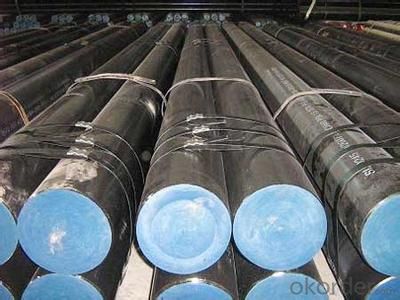
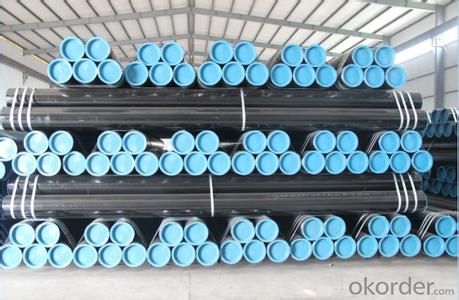
- Q: How are steel pipes installed underground?
- Steel pipes are installed underground through a process called trenchless installation or open trench excavation. In trenchless installation, a drilling machine creates a tunnel underground, and the steel pipes are then inserted into the tunnel using a technique called pipe jacking or horizontal directional drilling. In open trench excavation, a trench is dug, and the steel pipes are laid in the trench before being covered with backfill material.
- Q: Can steel pipes be used for automotive applications?
- Yes, steel pipes can be used for automotive applications. Steel pipes are commonly used in the automotive industry for various purposes such as exhaust systems, fuel lines, and hydraulic systems. Steel pipes offer high strength, durability, and resistance to corrosion, making them suitable for withstanding the harsh conditions and demands of automotive applications. Additionally, steel pipes can be easily formed and welded, allowing for customization and ease of installation. Overall, steel pipes provide a reliable and cost-effective solution for automotive applications.
- Q: What is the difference between steel pipe and tubing?
- Steel pipe and tubing serve various purposes, but they possess distinct dissimilarities. The fundamental distinction between them stems from their shape and dimensions. Steel pipe, ordinarily circular in shape, features a hollow interior. It is manufactured in a range of sizes and thicknesses to accommodate diverse pressure and temperature prerequisites. Steel pipe frequently finds employment in construction, plumbing, and the oil and gas industries for the conveyance of fluids or gases. Conversely, steel tubing can adopt a variety of shapes, such as circular, square, and rectangular. Unlike steel pipe, tubing is typically evaluated by its outer diameter and wall thickness. Structural applications, such as building frames, automotive components, and machinery, often employ steel tubing. Another divergence between steel pipe and tubing lies in their manufacturing processes. Steel pipe is typically fashioned from solid steel billets, which are heated and stretched to produce a seamless or welded tube. On the other hand, tubing can be generated through diverse methods, including hot or cold rolling, welding, or extrusion. In terms of strength and durability, both steel pipe and tubing offer excellent qualities. Nevertheless, the particular requirements of the application will dictate which one is more suitable. Steel pipe is frequently selected for high-pressure or high-temperature applications, whereas steel tubing is favored for structural purposes or when a specific shape is necessary. In summary, the primary disparity between steel pipe and tubing resides in their shape, measurement techniques, and manufacturing procedures. While steel pipe possesses a round shape and is measured by its inner diameter, tubing can adopt various shapes and is usually measured by its outer diameter. Both steel pipe and tubing find extensive use in diverse industries, but the choice depends on the specific application and requirements.
- Q: What are the different types of fittings used with steel pipes?
- There are several different types of fittings that are commonly used with steel pipes. These fittings are designed to connect, control, or change the direction of flow in a piping system. Some of the different types of fittings used with steel pipes include: 1. Elbow fittings: These fittings are used to change the direction of flow in a piping system. They come in various angles, such as 45 degrees or 90 degrees, and are commonly used to navigate around obstacles or create bends in the pipe. 2. Tee fittings: Tee fittings are used to create a branch or split in a piping system. They have three openings, with one being perpendicular to the other two. This allows for the connection of two pipes at a 90-degree angle. 3. Coupling fittings: Couplings are used to connect two pipes of the same size together. They are usually threaded and can be easily tightened or removed using a wrench. Couplings are commonly used in applications where pipes need to be joined or repaired. 4. Reducer fittings: Reducers are used to connect pipes of different sizes together. They have one end that is larger in diameter and another end that is smaller. Reducers are often used to transition between pipe sizes or to adapt to different equipment or fittings. 5. Flange fittings: Flanges are used to connect pipes, valves, or other equipment to create a secure and leak-proof connection. They consist of a flat, circular plate with holes for bolts or screws to fasten the flange to the pipe. Flange fittings are commonly used in applications where frequent disassembly and reassembly is required. 6. Union fittings: Union fittings are used to join two pipes together in a manner that allows for easy disconnection. They consist of three parts: a nut, a female end, and a male end. Union fittings are often used in applications where periodic maintenance or repairs are necessary. 7. Cap fittings: Cap fittings are used to seal the end of a pipe. They are typically threaded and can be easily screwed onto the end of the pipe. Cap fittings are commonly used in applications where pipes need to be temporarily closed off or protected. These are just a few examples of the different types of fittings used with steel pipes. The specific type of fitting required will depend on the application, the size and material of the pipe, and the desired functionality of the piping system.
- Q: What are the different types of coatings applied to steel pipes?
- There are several types of coatings applied to steel pipes, including epoxy coatings, fusion-bonded epoxy (FBE) coatings, polyethylene (PE) coatings, polyurethane (PU) coatings, and zinc coatings.
- Q: What are the common methods for joining steel pipes?
- Different methods exist for joining steel pipes, depending on specific applications and requirements. Some commonly employed techniques include the following: 1. Welding: Among the most frequently used methods to join steel pipes, welding involves heating the pipe ends and applying pressure to fuse them. Various techniques can be employed, such as arc welding, MIG welding, TIG welding, and even laser welding. 2. Threaded connections: This method involves threading the ends of steel pipes to create male and female connections. These threaded ends are then screwed together using pipe threads. Threaded connections are typically utilized for smaller diameter pipes and in low-pressure applications. 3. Flanged connections: Flanges are employed to join steel pipes in situations that necessitate easy assembly and disassembly or frequent maintenance. Flanges are flat, circular discs with bolt holes that allow for the bolting of pipes together. They offer a robust and leak-proof connection. 4. Compression fittings: Compression fittings enable the joining of steel pipes without the need for welding or threading. They consist of a compression nut, compression ring, and compression sleeve. The nut is tightened onto the sleeve, compressing it against the pipe and creating a secure connection. 5. Grooved couplings: Mechanical connections are created with grooved couplings, which are utilized to join steel pipes. The pipe ends are grooved, and a gasket is inserted between the grooves. The couplings are then tightened, compressing the gasket and forming a tight seal. 6. Soldering or brazing: These methods involve the use of filler metal with a lower melting point than the steel pipes. The filler metal is heated and melted, allowing it to flow between the pipe joints and create a bond. Soldering is generally suited for smaller diameter pipes and low-pressure applications. Each joining method has its own advantages and limitations. The appropriate method for joining steel pipes depends on factors such as pipe diameter, application, working pressure, and required joint durability. It is crucial to consider these factors and consult industry standards and guidelines when selecting the suitable joining method for steel pipes.
- Q: Can steel pipes withstand high temperatures?
- Yes, steel pipes can withstand high temperatures. Steel is known for its excellent thermal conductivity and high melting point, making it suitable for various applications that involve exposure to elevated temperatures.
- Q: Are steel pipes suitable for use in acidic environments?
- Yes, steel pipes are generally suitable for use in acidic environments. However, the specific grade of steel and the concentration of the acid should be considered to ensure proper corrosion resistance. Coating or lining the pipes with materials such as epoxy or rubber can also enhance their resistance to acidic conditions.
- Q: What are the different types of steel pipe bends?
- There are three main types of steel pipe bends: 90-degree bends, 45-degree bends, and 180-degree bends. These bends are commonly used in piping systems to redirect the flow of fluids or gases in a desired direction.
- Q: How are steel pipes classified based on their diameter?
- Steel pipes are classified based on their diameter by categorizing them into different size ranges, such as small diameter pipes, medium diameter pipes, and large diameter pipes.
Send your message to us
APL 5L ERW Steel Pipe
- Loading Port:
- China Main Port
- Payment Terms:
- TT or LC
- Min Order Qty:
- 60 m.t.
- Supply Capability:
- 9000 m.t./month
OKorder Service Pledge
OKorder Financial Service
Similar products
Hot products
Hot Searches
Related keywords
